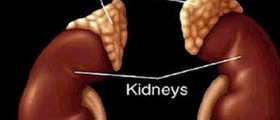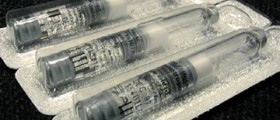
Endocrine system is an important system in the human body, comprising of glands that secrete different hormones. Hormones are released into the bloodstream and their main function is to regulate processes such as metabolism, growth and sexual development. One hormone can affect and regulate one or more organs or functions in the body.
The most important glands in the human body are hypothalamus, pituitary, thyroid and parathyroid glands, adrenals, pineal body, ovaries and testes. Pancreas, even though it is vital for digestion, also produces hormones and is considered a part of the endocrine system.
Hypothalamus
The hypothalamus is located in the brain, in its lower central portion. This part of the brain regulates functions like body temperature, metabolism and satiety. It also produces hormones that regulate hormone-secreting activity of another gland, the pituitary.
Pituitary gland
The pituitary gland is another gland located in the brain, at its base. It is located beneath the hypothalamus and it is very small, like a pea. However, it is probably the most important gland in the human body, since it releases hormones that regulate the function of other endocrine glands.
This gland is divided into two sections- the anterior lobe and the posterior lobe. The anterior lobe of the pituitary gland produces growth hormone, thyroid-stimulating hormone, adrenocorticotropin hormone, prolactin, luteinizing hormone, antidiuretic hormone and oxycotin. The hormones secreted by the posterior lobe are in fact produced by the brain but then carried to the pituitary gland.
Thyroid gland
The thyroid gland located in the lower front part of the neck produces hormones that regulate the metabolism. Aside from metabolism, thyroid hormones also regulate heart rate, blood pressure, muscles and reproductive functions, as well as the digestion.
Parathyroid glands, two of them located on the surface of the thyroid gland, are important in regulation of calcium levels.
Adrenal glands
Adrenal glands are located on top of the kidneys, one on each kidney. The outer part of these glands, called adrenal cortex, produces corticosteroids which regulate metabolism, electrolytes, sexual function and the immune system, while the interior part produces catecholamines, such as adrenaline, which regulate the way in which the body responds to physical or emotional stress.
Reproductive glands
Reproductive glands are testes in males and ovaries in females. They both produce sex hormones. In men, testes, located in the scrotum, produce and release androgens, hormones that include testosterone. They control male sex characteristics and sperm production. In women, ovaries, located on the left and right of the uterus, in addition to producing eggs, also produce estrogen and progesterone. These hormones regulate female sex characteristics and reproductive functions, such as menstrual periods and ovulation.











-In-Adults_f_280x120.jpg)




Your thoughts on this
Loading...